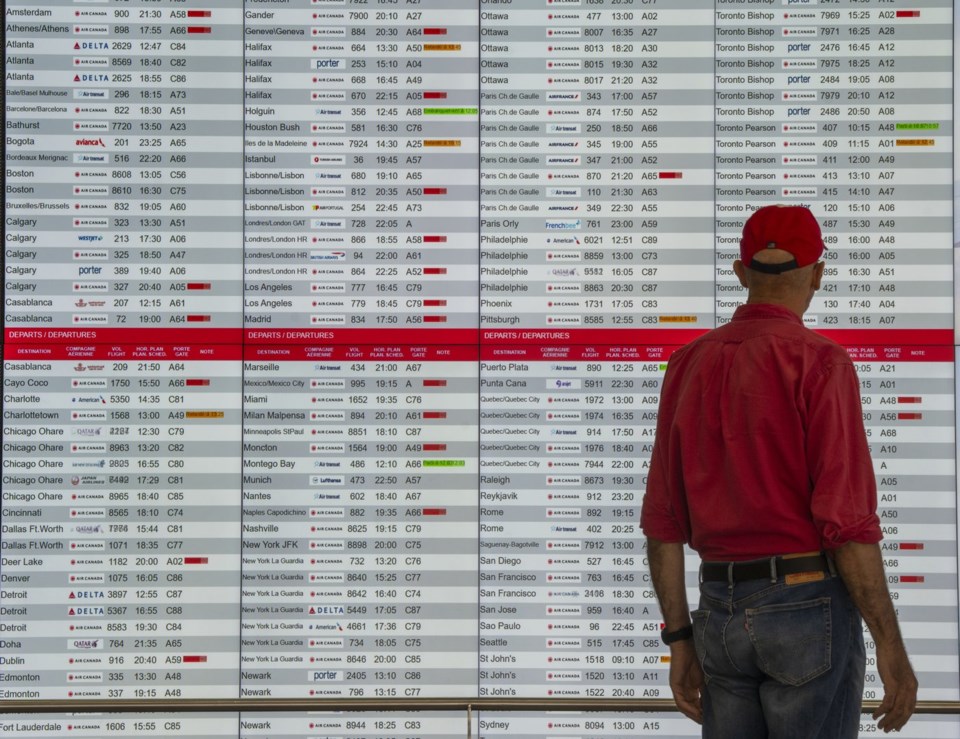Air Canada customers looking to lodge a complaint with the regulator over their experience during the recent flight attendants' strike should prepare for a wait.
The Canadian Transportation Agency said its backlog of air travel complaints stood at about 85,000 as of Aug. 14, two days before the strike started.
The agency had received nearly 13,500 complaints this year as of that date, which would not yet have included complaints related to the Air Canada work stoppage.
The backlog has been growing since the federal government passed rules that came into force in 2019 that set compensation amounts for flight delays, cancellations and the like.
The CTA implemented a new system in 2023 to ramp up its capacity to deal with complaints, but the number of gripes being submitted has also swelled.
The agency received nearly 47,000 complaints during the 2024-25 fiscal year, up from around 43,500 in 2023-24 and 42,000 the year before that.
Complaints in 2022-23 skyrocketed from the prior year, when the agency received around 12,000.
"This unpredictability in complaint volumes poses challenges in planning for case processing times and delivering accurate information to the public," said CTA spokesperson Jadrino Huot in an email.
"To mitigate this risk, the CTA continually reviews and streamlines its business processes and procedures, while also adopting new technologies and tools to enhance efficiency."
Huot said that in the 2024-25 fiscal year, the CTA closed more than 33,600 complaints, a sharp increase from previous years, but not enough to reduce the growing backlog.
With the current logjam, customers who have filed a complaint with the CTA can expect to wait 1.5 to two years for a resolution, if not longer as the system becomes increasingly overwhelmed, said Air Passenger Rights advocacy group president Gabor Lukacs.
He said he recommends customers instead take the airline to small claims court where cases can often be resolved more swiftly.
At the CTA, unresolved cases continue to pile up in part because Canada’s passenger rights charter is "unnecessarily and disproportionately complex," especially compared with its European counterpart, said Lukacs.
He said that increases how long it takes the CTA to decide whether or not compensation is owed by an airline.
The agency also hasn't implemented a cost recovery fee that would force airlines to contribute to the cost of the complaint resolution process, he said.
"The current strike and its aftermath and how passengers were treated bears evidence that the Canadian Transportation Agency is just not fulfilling its function when it comes to the (regulations)," said Lukacs.
Huot said that with regards to the recent Air Canada strike, the Canada Transportation Act stipulates that passengers must first contact the airline in writing with their claims.
After doing so, passengers who still believe the airline has not met its obligations, or have not received a response within 30 days, may submit a complaint to the CTA.
Air Canada has offered customers with cancelled flights related to the work stoppage a full refund or credit for future travel if they could not be rebooked on a competitor's flight.
The company also announced a reimbursement policy last week for alternative transportation and out-of-pocket expenses.
Those with cancelled Air Canada flights originally scheduled to depart from Aug. 15 to Aug. 23 can submit a request to be reimbursed for the cost of their alternative arrangements through a form on Air Canada's website. The policy also covers "reasonable expenses" for hotel stays, meals and other related costs.
It said it may take four to six weeks to reimburse affected customers "due to the anticipated volume" of claims.
"If Air Canada is willing to do the right thing, I would go along with the form," said Lukacs.
"But the form is not the end of the road. The form is just the beginning of the road. It's the easiest way possible for Air Canada to do what is required by law."
This report by The Canadian Press was first published Aug. 25, 2025.
Companies in this story: (TSX:AC)
Sammy Hudes, The Canadian Press



